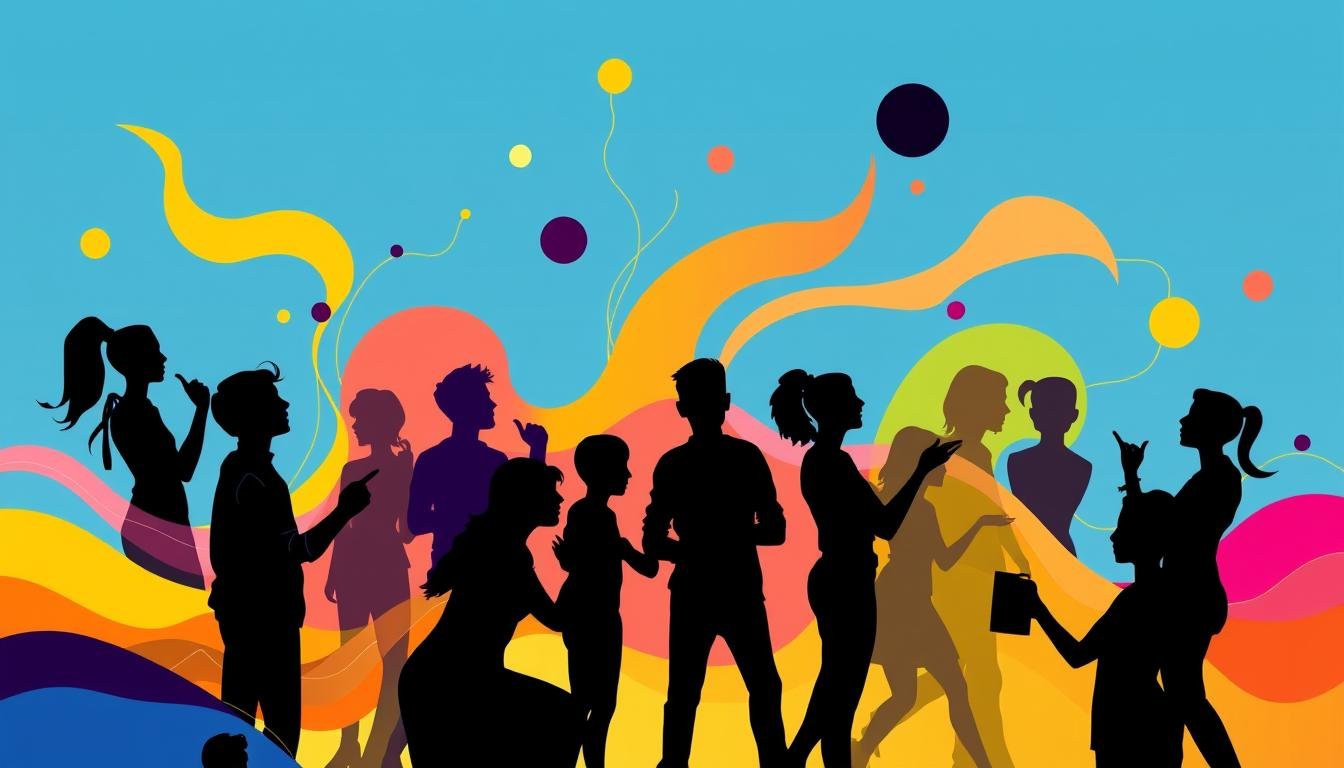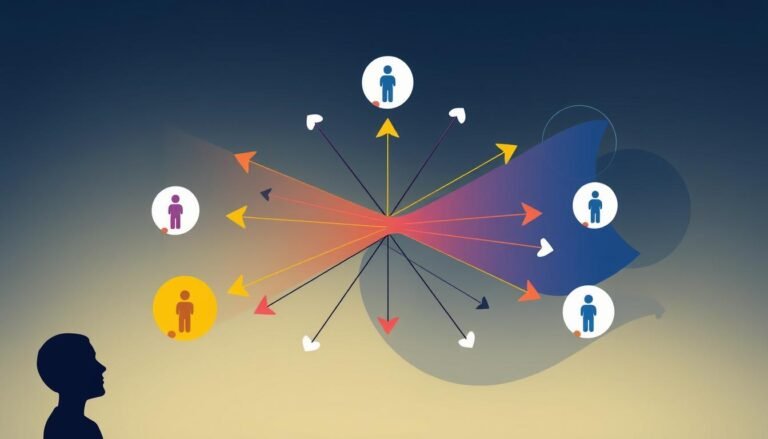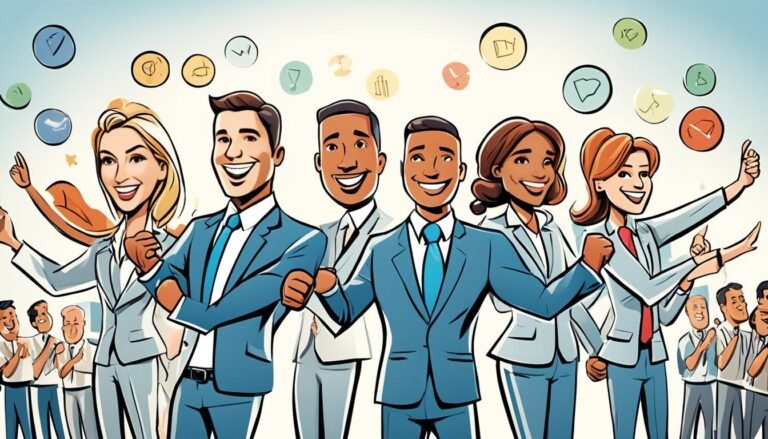Personality Dynamics in Team Performance
Team building is more than just skills and knowledge. It’s about understanding the unique personalities that shape how a team works together. Leaders who succeed know that they must look into each person’s attitude, behavior, and thinking.
In today’s fast world, the right mix of personalities is key to a team’s success. It’s not just about hiring skilled people. It’s about creating a team that works well together. This means thinking about how different personalities interact and support each other.
A 2016 study showed how important personality is in team success. It found that skills like clear communication, trust, and emotional intelligence are crucial. These skills are linked to personality and greatly affect how well a team works together.
The American Psychological Association (APA) says that teams with members who are good at learning and solving problems work better together. This shows that leaders need to think about both what each person can do and how they fit with others in the team.
Key Takeaways
- Personality dynamics significantly influence team success
- Effective team composition involves more than just skills assessment
- Understanding individual attitudes and behaviors is crucial for team building
- Research supports the link between personality traits and team performance
- Leaders must navigate complex interpersonal interactions for optimal results
- Balancing different personalities contributes to a high-performing team
Understanding Team Personality Foundations
Team dynamics are key to success in organizations. Research shows that good team dynamics can make individuals and teams 50% better at achieving goals. This boost comes from using the unique traits of each team member.
The Role of Individual Differences
Every team member has something special to offer. Studies find that diverse teams solve problems 35% better than uniform ones. This variety leads to new ideas and better decision-making.
Impact of Personality on Work Approach
Personality shapes how we tackle tasks and work together. Knowing your team’s personality can increase engagement by 25%. This knowledge helps tailor how teams work together, making them 34% more effective.
Core Personality Traits in Teams
Important traits include being introverted or extroverted, conscientious, agreeable, and open to new experiences. These traits influence how we work and interact in teams. Using personality tests can cut turnover by 30% and boost job performance by 70%.
| Personality Trait | Impact on Team Dynamics | Performance Boost |
|---|---|---|
| Emotional Intelligence | Enhances collaboration | 70% increase |
| Conscientiousness | Improves productivity | 30% increase |
| Openness to Experience | Fosters innovation | 21% increase |
Knowing these traits helps build well-rounded teams. By promoting respect and trust, companies can see a 40% drop in staff turnover in just a year. Embracing differences and improving teamwork can greatly enhance performance and success.
The Science Behind Team Compatibility
Team compatibility comes from knowing how personalities work together. Studies show interesting facts about how different traits affect teamwork. A study with 220 people found that being outgoing, friendly, and responsible can help a team.
But, too much of these traits can actually hurt teamwork. This means that being just right is best for working well together. Another study with 314 people in learning groups also found this to be true.
This knowledge is key for building strong teams. Traits like being outgoing, responsible, and friendly are good for teamwork. However, too much of these can make things worse.
“Effective contributions to teamwork are achieved at average rather than very high levels of conscientiousness, extraversion, and agreeableness.”
This new understanding of personalities changes how we think about team building. It shows that teams need a mix of personalities to do well. Creating a place where everyone feels heard is important for teamwork success.
Personality Dynamics in Team Performance
Team success depends on how different personalities work together. It’s important to understand these dynamics to improve teamwork and leadership. Let’s see how various personalities help teams succeed.
Introverts vs Extroverts in Team Settings
Introverts are great at working alone, adding depth and focus to projects. Extroverts, meanwhile, shine in groups, bringing energy and excitement. A mix of both can boost team productivity by 50%.
Conscientiousness and Team Productivity
Conscientious team members are key to success. They focus on details and strive for excellence. Research shows teams with conscientious members see a 35% jump in quality.
Agreeableness in Group Dynamics
Agreeable team members help create a cooperative atmosphere. Less agreeable ones add assertiveness. A mix of these traits can lead to a 50% chance of reaching goals. This mix encourages healthy debate and creative problem-solving.
| Personality Trait | Team Impact | Performance Boost |
|---|---|---|
| Introvert-Extrovert Mix | Balanced energy and focus | 50% increase in productivity |
| High Conscientiousness | Improved work quality | 35% better outcomes |
| Agreeableness Balance | Enhanced goal achievement | 50% higher success rate |
Understanding and using these personality dynamics is crucial for top teams. By valuing diversity, leaders can make sure everyone’s strengths help the team win together.
Building High-Performing Teams Through Personality Assessment
Personality assessments are key in team building and boosting emotional intelligence. They give insights into individual traits, how we communicate, and what we prefer at work. Knowing each team member’s unique qualities helps create better and more united work spaces.
Personality Profiling Tools
Many popular personality tests are used in team building:
- Myers-Briggs Type Indicator (MBTI): Categorizes individuals into 16 personality types based on four dimensions
- DiSC Assessment: Focuses on four behavioral styles – Dominance, Influence, Steadiness, and Conscientiousness
- Enneagram: Identifies nine distinct personality types, each with unique motivations and behavioral patterns
Team Composition Strategies
Choosing the right assessment is key to team building. It’s important to clearly state the goals and make sure everyone feels comfortable. Understanding the results helps spot talents, areas to improve, and who should do what based on their personality.
Balance of Personality Types
Having a mix of personality types in a team can make communication, solving conflicts, and working together better. These tests give real insights into people’s skills, traits, and emotional smarts. This info helps leaders make their teams work better together and create a strong team spirit.
| Assessment Benefits | Implementation Strategies |
|---|---|
| Better communication | Select appropriate assessment tool |
| Improved teamwork | Communicate objectives clearly |
| Conflict resolution | Provide comfortable testing environment |
| Skill development | Interpret results accurately |
| Enhanced collaboration | Customize feedback for each team member |
Using personality tests in team building helps organizations create top-notch teams. These teams use everyone’s strengths and build a positive work atmosphere.
Communication Patterns and Team Dynamics
Communication is key in team dynamics. Good team interaction is the foundation of success. Teams that communicate well often do better than those that don’t.
A recent survey found that 65% of people think bad team dynamics hurt performance a lot. This shows how important it is to have good communication in teams.
Great teams listen well and build trust. This makes a space where ideas can flow and creativity grows. In fact, teams that work well together finish tasks 50% faster.
- Clear communication reduces misunderstandings
- Trust fosters openness and support
- Effective collaboration leads to innovation
In today’s world, technology is key for team work. Tools like Microsoft Teams and Zoom help teams talk and share ideas, especially online. These tools make it easier for teams to work together and share ideas.
Positive team dynamics lead to enhanced collaboration, improved communication, higher morale, and motivation.
To make teams better, leaders should promote open talk and solve conflicts well. Celebrating wins and creating a culture of responsibility can lead to great results. By focusing on these, teams can work together smoothly and communicate clearly, boosting productivity and creativity.
Emotional Intelligence in Team Settings
Emotional intelligence is vital in team settings. It affects how team members talk, work together, and interact. Let’s see how it impacts team performance and relationships.
Understanding Group Emotions
Group emotions greatly affect team performance. Teams with high emotional intelligence build trust and safety. This boosts innovation and productivity.
Studies show these teams handle conflicts better and find creative solutions.
Developing Emotional Awareness
Being aware of emotions is crucial for good team interaction. Team members who know their and others’ emotions communicate better. They pick up on nonverbal signals and adjust their way of talking.
This skill is especially useful in diverse teams. Different views make discussions richer.
Managing Team Relationships
Strong team bonds are based on trust and respect. Emotionally smart team members listen well and build real connections. They make sure everyone feels heard and understood.
This leads to empathy and stronger team ties. It improves how teams work together and perform.
| Emotional Intelligence Factor | Impact on Team Performance |
|---|---|
| Trust and Psychological Safety | Increased innovation and productivity |
| Effective Communication | Better conflict resolution and collaboration |
| Empathy and Understanding | Stronger team relationships and improved performance |
Conflict Resolution and Personality Types
Conflict resolution is key in team dynamics. Different personalities handle interactions in unique ways, affecting conflict outcomes. Knowing these differences can boost teamwork and performance.
Studies show teams with diverse personalities are 25% more likely to solve disputes creatively. This diversity brings new ideas but can also lead to communication and understanding hurdles.
A study by the American Psychological Association found 60% of employees face barriers in teamwork due to personality differences. This shows the need for strategies that consider personality in conflict resolution.
- Extroverts may prefer face-to-face discussions
- Introverts might favor written communication
- Analytical types often seek data-driven solutions
- Empathetic individuals focus on emotional aspects
Companies using personality-based conflict resolution see a 30% drop in downtime due to conflicts. This method not only solves problems quicker but also creates a more peaceful work environment.
| Personality Type | Conflict Approach | Effectiveness |
|---|---|---|
| Extrovert | Direct confrontation | 70% |
| Introvert | Reflective analysis | 65% |
| Analytical | Fact-based resolution | 80% |
| Empathetic | Emotional mediation | 75% |
By accepting and using personality differences, teams can turn conflicts into chances for growth and innovation.
Leveraging Diversity in Team Composition
Diversity in team composition is key for group cohesion and team building. As the U.S. workforce changes, embracing diversity becomes more vital. By 2030, international migration will drive population growth, showing the need for inclusive teams.
Cultural Diversity Impact
The U.S. labor force has seen a rise in foreign-born workers. From 13.3% in 2000 to 17.4% in 2017, cultural diversity has grown. This brings new ideas and ways to solve problems, improving team dynamics. Women now make up nearly half of the workforce, adding to team diversity.
Cognitive Diversity Benefits
Cognitive diversity boosts innovation and creativity in teams. A study of 1,568 medical teams showed diversity in online reputation and knowledge improves performance. This means different thinking styles and expertise can make teams more effective.
Integration Strategies
Organizations must use effective integration strategies to tap into diverse strengths. A survey of 10,400 business leaders found 69% see diversity and inclusion as key, a 32% increase since 2014. Successful team building includes:
- Preventing discrimination and exclusion
- Creating inclusive environments
- Leveraging diverse skills and perspectives
- Fostering open communication
By focusing on these strategies, teams can fully benefit from diversity and enhance cohesion. The secret to successful team building is valuing each member’s unique contributions.
Team Building Activities for Different Personalities
Team building activities are key to boosting job happiness and team spirit. Forbes says they are essential for better team performance. It’s crucial to pick activities that fit everyone’s personality.
Good team building helps teams communicate better, work together, and share values. Games like Blind Drawing and Human Knot improve problem-solving and teamwork. These short activities can greatly improve how well a team works together.
Anthony Mixides, MD at bond media, emphasizes team-building’s importance in 2023. Activities like 3 Question Mingle and Awareness Circle help build trust and relationships. By matching activities to team goals, companies can strengthen bonds and improve work practices.
Some might be hesitant about team building, but well-chosen activities can really help. From quick games to big retreats, these experiences make a company’s culture stronger and team dynamics better.
Source Links
- Enhance Team Dynamics with Personality Insights
- How understanding different personality types improves team dynamics
- Understanding Team Dynamics Through Personality Tests – Ledger
- What Is Team Dynamics? Importance, Key Elements, and Factors • ActiveCollab
- How can personality tests enhance team dynamics and collaboration in the workplace?
- Master Team Dynamics for Better Collaboration and Productivity
- The Science Behind Successful Teams: Why Personality Testing Matters
- Personality characteristics that are valued in teams: Not always “more is better”?
- Personality and Team Dynamics: Building Strong Teams
- How Analyzing Your Group’s Team Dynamics Enhances Team Performance
- How to Build a High-Performing Team with Personality Tests
- Deeper Signals | 4 ways assessments help build high performance teams
- Understanding and Improving Team Dynamics: Maximizing Team Performance| Spike
- What Are Team Dynamics and Why You Should Make Them a Priority
- What is team dynamics in the workplace: Tips & examples to improve it
- The Impact of Emotional Intelligence on Team Dynamics – ESOFT Lifelong Learning
- Emotional Intelligence and Team Dynamics: Building Stronger Collaborative Bonds
- Emotional intelligence, leadership, and work teams: A hybrid literature review
- How do personality tests impact team dynamics and workplace culture?
- The Influence of Personality Types on Conflict Perception and Resolution in Teams
- How to Manage Diversity and Enhance Team Performance: Evidence from Online Doctor Teams in China
- 66 team building activities to bring your team together | SessionLab
- 65 Amazing Team Building Activities Your Employees Will Love (+How to Play)








